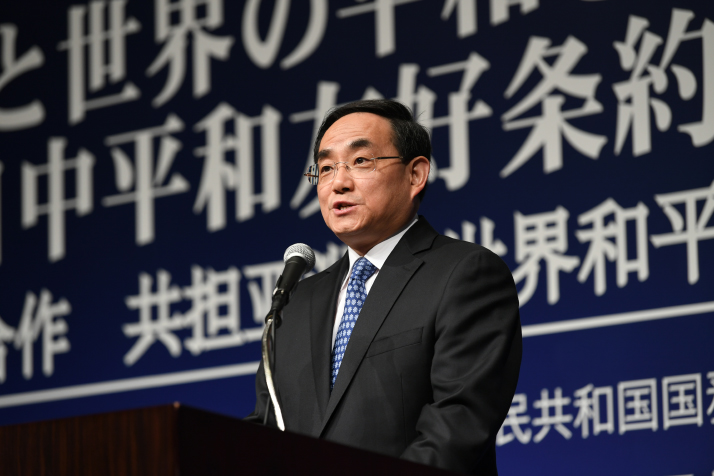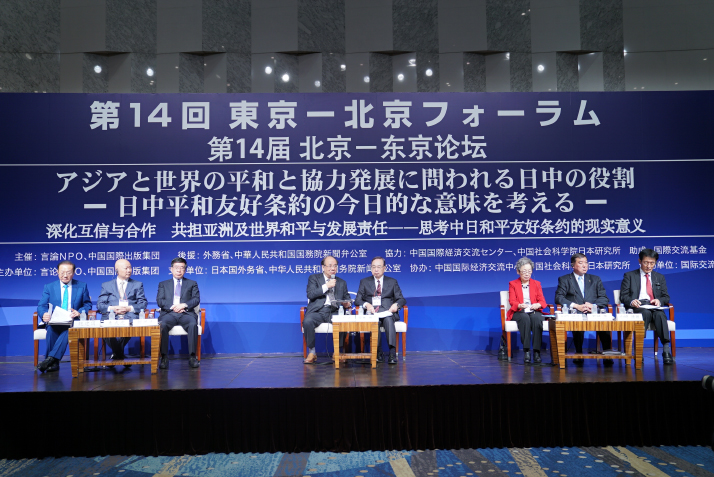| World |
| Foundations of Friendship | |
| Beijing-Tokyo Forum calls for deepening mutual trust | |
|
|
 Xu Lin, Minister of the State Council Information Office of China, delivers a speech at the opening ceremony of the 14th Beijing-Tokyo Forum in Tokyo, Japan, on October 14 (SHEN XIAONING)
A survey conducted between August and September shows that Chinese people's impression of Japan has improved since 2014, matching the momentum of improved bilateral ties. The result was released ahead of the 14th Beijing-Tokyo Forum held in Tokyo on October 14-15, the highest platform for civil diplomatic dialogue between China and Japan.
According to the survey, 40 percent of the 1,500 respondents across China said their feelings toward Japan have "improved" or "comparatively improved" this year, a two-fold increase from 20.4 percent in 2017. Also, 30.2 percent believed that relations between China and Japan are "getting better," while 24.1 percent felt the opposite. The figures were 14.7 percent and 44.5 percent, respectively last year. However, 38.2 percent of the respondents thought bilateral ties would be "better" or "relatively better" in the future, a 9.4-percent increase compared to 2017. After years of freeze-up due to territorial disputes and Japan's revisionist attitude toward its past war crimes, China-Japan relations have seen signs of thaw in the past two years. Since 2017, Tokyo has been seeking rapprochement with Beijing by expressing interest in the China-proposed Belt and Road Initiative as well as Japanese Prime Minister Shinzo Abe's attending a ceremony marking China's National Day at the Chinese Embassy in Tokyo. In May, Chinese Premier Li Keqiang paid an official visit to Japan, the first in eight years by a Chinese premier. President Xi Jinping met Abe on the sidelines of the fourth Eastern Economic Forum held in Russia in September, and they agreed to improve bilateral ties and shoulder joint responsibilities in promoting regional and global peace and stability, as well as development and prosperity. In late October, Abe will pay an official visit to China, the first by a Japanese prime minister in seven years. These high-level exchanges are charting the course for the future development of bilateral relations. Against this backdrop, the 14th Beijing-Tokyo Forum, co-organized by the China International Publishing Group (CIPG) and the non-profit Japanese think tank Genron NPO, took the theme "deepening mutual trust and cooperation, sharing responsibility for peace and development in Asia and the world, and exploring the practical significance of the Treaty of Peace and Friendship." With the attendance of more than 100 participants from political, business, academic and media circles of the two countries, in-depth discussions were held on key issues affecting bilateral relations such as political mutual trust, economic and trade cooperation, security assurance and media responsibility, among others.  Chinese and Japanese delegates at the 14th Beijing-Tokyo Forum in Tokyo, Japan, on October 14 (SHEN XIAONING)
Future-oriented relations When addressing the opening ceremony of the forum, Xu Lin, Minister of the State Council Information Office of China, said that this year not only marks the 40th anniversary of China's reform and opening up, but also the 40th anniversary of the signing of the Treaty of Peace and Friendship between China and Japan. The two anniversaries are rich in connotations and are interrelated, inspiring the two countries to promote current bilateral relations. Xu stressed that peace, friendship and cooperation are the three essentials to keeping bilateral relations on the right track. These three elements conform to the common aspirations of the two peoples, serve the common interests of China and Japan, and keep abreast of the trend of the times, he said. Xu suggested the two countries draw lessons from history, maintain a stable development of bilateral relations and seek mutual trust and common ground. He also urged them to deepen practical cooperation, follow the principle of mutual benefit and enhance friendship between their people. Former UN Under-Secretary-General for Humanitarian Affairs and Emergency Relief Coordinator Yasushi Akashi said China plays an important role in the formation and development of the existing international order. He called on the two countries to build future-oriented friendly relations on the 40th anniversary of the Treaty of Peace and Friendship. With China and Japan both facing the challenges of providing adequate social welfare and healthcare to their people, an aging society and global warming, Akashi said the two countries should make corresponding policies to achieve connectivity and co-participation on global issues. China-Japan relations are of vital importance to both, playing an increasingly important role in the peace, stability and prosperity of the region and the world at large, Chinese Ambassador to Japan, Cheng Yonghua, said. He suggested the two sides deepen political mutual trust, properly manage their differences and strengthen exchanges and cooperation. CIPG Vice President Fang Zhenghui stressed that extensive and in-depth people-to-people dialogue and exchanges are the foundation of China-Japan friendship. In-depth discussions on topics such as the role China and Japan should play in achieving peace in Northeast Asia and Sino-Japanese cooperation in the digital economy are anticipated in the future, Fang said. The forum adopted the Tokyo Consensus in which the two sides agreed to jointly safeguard regional peace, prosperity, stability and development and enhance bilateral and multilateral trade and economic cooperation, as well as boost people-to-people exchanges to promote continued improvement and development of bilateral ties. All-dimensional dialogue At sub-forums on political mutual trust, trade and economy, security and media, participants exchanged views on enhancing political mutual trust, developing cooperation in emerging industries and maintaining regional peace and stability. They also discussed improving the public opinion environment and exploring cooperation in fields such as the low-carbon and digital economy. As two major world economies, China and Japan should cooperate to promote regional multilateral mechanisms such as the China-Japan-South Korea Free Trade Agreement and Regional Comprehensive Economic Partnership to safeguard the global free trade system, Fan Gang, a well-known Chinese economist, said. According to Japan's Deputy Chief Cabinet Secretary Yasutoshi Nishimura, mutual investment between Japan and China amounts to 60 billion yuan ($8.7 billion). Currently, there are about 30,000 Japanese-funded enterprises and institutions in China. The two countries are economically interdependent and should continue to explore third-party market cooperation and cooperation in potential fields such as the digital and green economy, Nishimura said. In response to Japan's concerns on the rapid emergence of China on the global stage and its rising defense capabilities, the Chinese participants reiterated that China will never interfere in other countries' affairs or try to exert influence on others. It will never seek hegemony or expansion. They said upholding the spirit of the Treaty of Peace and Friendship and taking win-win cooperation as a common goal, China and Japan must share the responsibility to jointly oppose the hegemonic threats in the international community and safeguard the stability and prosperity of Asia and the world at large. During the forum, representatives from the two sides also expressed the belief that with the global free trade environment facing increasingly grave challenges and unilateralism posing a major threat to the world economy, China and Japan should work together to safeguard an open, rule-based free trade system and international cooperation focusing on multilateralism against protectionism. According to the Tokyo Concensus, the two should promote reform of the World Trade Organization and of their own economic structures, seeking further bilateral and multilateral economic cooperation in East Asia and greater trade, economic and capital exchanges. The joint statement said China and Japan have a crisis management mechanism, but its level needs to be enhanced. Regular consultations on crisis prevention and control should be initiated as soon as possible to explore setting up more relevant mechanisms. The participants reiterated that peace and development in East Asia, and even throughout Asia, need not only the joint efforts of experts and scholars, but also the broad support of the people of the two countries. To ensure a bright future for Asia, the two countries should develop long-term plans, conduct extensive and rational discussions, and create a sound public opinion environment for intergovernmental diplomacy. (Reporting from Tokyo) Copyedited by Sudeshna Sarkar Comments to mamm@bjreview.com |
|
||||||||||||||||||||||||||||||
|
